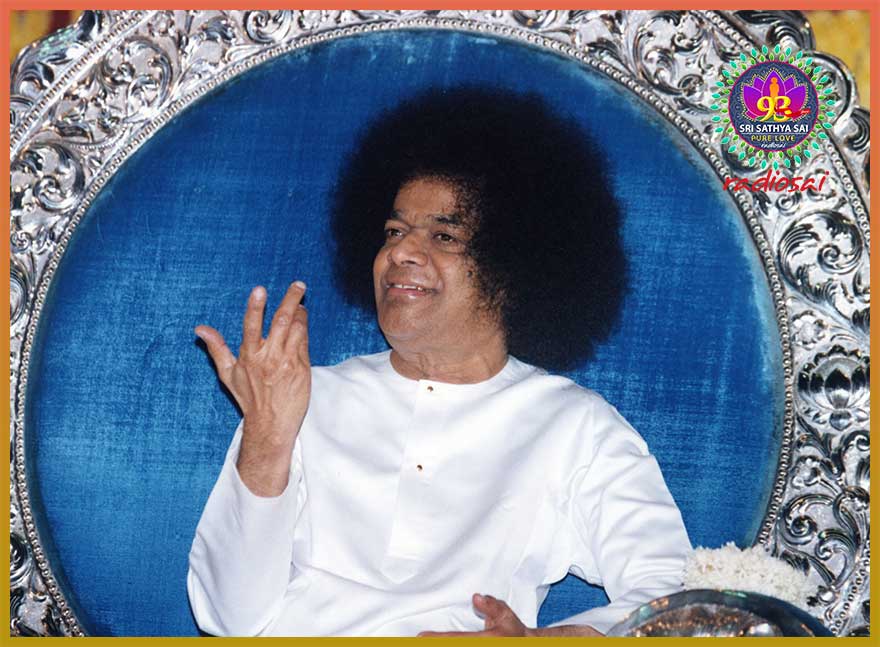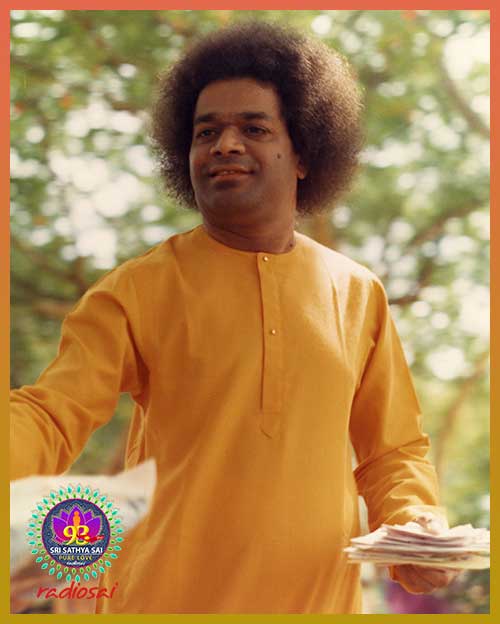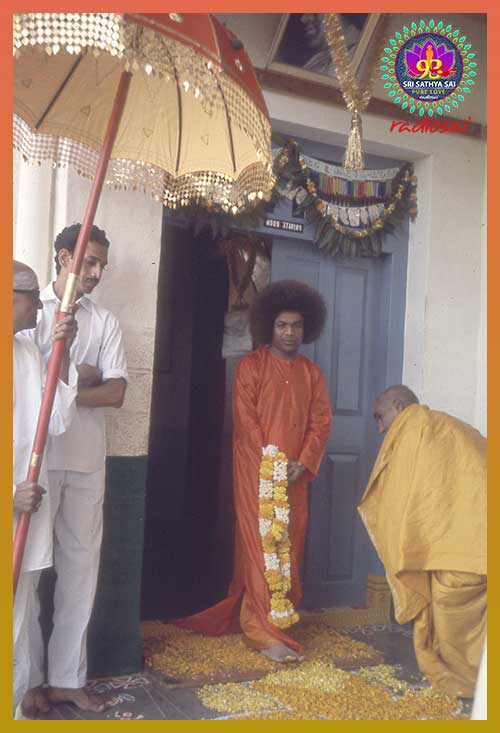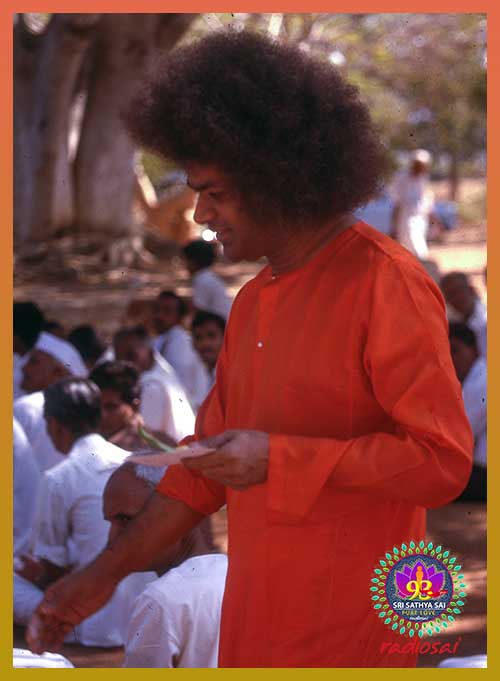|
|
| 'Like' us on Facebook | Follow us: |
Posted on: Nov 18, 2018
YOUR GOD AND MY GOD
The Immense Import of the Advent of Sri Sathya Sai
And the Compelling Reason Why the World Needs to Awaken to His Message
Mr B K Misra
Mr Misra taught English in various colleges in Odisha from 1966 until he joined the Sri Sathya Sai Higher Secondary School at Prasanthi Nilayam as an English teacher in 1980. He retired from the school in 2000, but till date he has been sharing the same responsibility with diligence.
He has translated into Odia many books of Swami, many of his dramas have been presented before Bhagawan by the school boys, and the Odisha youth. He has also published a book of poems in English on Swami’s impact on his life. We have published a number of his articles in these columns too. He has been an insightful writer.
As we eagerly look forward to merrily celebrate the 93rd Birthday of Bhagawan, Mr Misra contemplates on the concept of God, the way it was in the beginning, the distortions and degradations that have happened over centuries and the profound significance of the birth of Sri Sathya Sai in this context. He says, “The One who holds our hands to take us through the debris of our lives to the threshold of a new world of unity and happiness… is Sathya Sai.”
Once Swami said in a lighter mood, “Your gods are made by Ravi and Kavi.” He referred to the pictures of gods painted by Ravi Varma, and imagined by poets. The personalities of the gods imprinted in our minds are created by us, and by poets, painters and puranas. It is same with the theologies too.
Then Swami asked, “How do you know Krishna looked like what you think? Have you seen Him?” The reality of divinity is not the way we think it is.
And in a powerful message He taught us, “There is only one God, He is omnipresent.” With that one statement He resolved all the warring ideologies of all religions.
In fact, the idea of ‘God’ as an entity is alien to native Bharatiya thought. Vedas refer to it (strictly speaking, we cannot even refer to Him as ‘Him’) as all-pervading and all transcending Truth, Tat Sat.
 |
So, the many gods devised later are the many different ways we wanted to contact the Omnipresent. When our intelligence (not intellect) couldn’t conceive of Tat Sat and experience it, an attempt was made to visualise it through the many facets of that Truth, and gods as entities were born representing them.
However, the many gods were always regarded as the many faces of the One Truth - Ekam Sat, viprah bahudha vadanti, the one non-dual Truth perceived through many facets. This made it easier to integrate an impersonal Truth into personal lives.
But when rituals developed as means of invoking the power and benevolence of the many facets of Tat to deal with the problems of life, then the visualization of the ultimate purpose was diluted, the many instead of one captured the imagination of people, and the One Transcending Truth was pushed to the background. Concepts acquired forms, stories were made to make them more earth-bound, and differences grew. Very few wanted access to the highest truth.
Once the unity of vision was broken up, society too broke up; castes were created, their parameters were drawn, rights and privileges defined, universal education denied, equality, which was the cornerstone of Vedic vision, was frowned upon, and a huge literature to humanize the divine tried to perpetuate the corruption. The high levels of science, technology, arts and economic wellbeing achieved in this country was gradually forgotten.
Jainism and Buddhism tried to repair the crack by teaching universal social relevance of the One Without a Second, and downplay the growing division with some temporary success. In the meantime trade and travel were opening the borders of Bharat to the world which was waking up to her wealth. Islam came, Christianity came, and feeding on the diversified society, completed the rout.
Islam brought its own God, Christianity brought its own Son of God; their One without many offered a single suit forall, a single concept, obedience to prescribed precepts, completely at variance with the Vedic freedom.
 |
We lost both, our political and spiritual freedom. The division of the Vedic vision, the Tat Sat, divided us further, a sort of war started between our many gods, and the imported new single God. But this war only intensified the simmering wars we had initiated in our own beliefs, the vadas (opinions) about the singularity of Tat Sat had already created vivadas (conflicts), and when the new imported vada jumped into the fray, we were powerless to prevent it. The different vada-schools projected themselves as the ultimate truth, sometimes made efforts to win over other schools to their side to strengthen their rank and file, like political parties do today with impunity, created dogmas and insignias, imposed codes of conduct, introduced conversions, used political power to perpetuate their vadas, and the Vedic vision was on the brink of a myth ready to be scoffed at as aboriginal and uncivilised, and dumped.
While great gurus went round the country fighting for their individual vadas, and converting others into their opinions, more and more people were denied education, health benefits, freedom of thought and movement. They were forced into grades of inferiority in rights and privileges, and the once enlightened Bharat slid fast into more and more darkness.
A very small section of people claimed to hold the patent of enlightenment, and insisted on the rights of its distribution, enlarging the growing economic and class disparities. Vedic Bharat, who projected every human being as a child of immortality, an equal participant in the bounty of Nature, moaned and mourned, but no one heard her. Thus, before our invaders dared called us pagans, we had already pushed away a huge part of our ‘fellow immortals’ as pagans.
The stage was set for a protracted battle between ‘your God and my God’, between the pagans and the ‘bringers of light’! And the great irony was that we increasingly accepted the joke as truth! The cost has been heavy for us to pay over the centuries, with big premiums. It has been very painful to realise that the cuts it has made in the body of Bharat are quite deep, very difficult to heal. With the society constitutionally divided into a hundred castes and sub-castes, their separate rights demarcated, the modern Bharat is going through a sad disintegration which affects her existence on all levels. A civilisation which was built on a vision of cosmic unity, of universal wellbeing, which was not an empirical statement but a living truth, stood nearly destroyed.
When a people lose their pride in themselves, nothing is left of them. For generations now, our parents and our schools have taught us that we never had a great past to cherish. We have trained ourselves to accept gratefully the crumbs of bread others give us from their tables, and learnt to adore these crumbs while a huge wealth we created lies buried in the forgotten history. Our histories are written by them, our school texts are written by them, our love songs are composed by them, our policies on national identity are dictated by them, our dress, food, beliefs and even entertainments are tailored by them; we buy their products to survive, we employ governesses trained by them to look after our children, and our entire youth population is on an overdrive to be like them while the older ones regret they could not be so!
When the degeneration threatened our very existence we desperately needed someone who could stand on the soil, and call halt to this mad rush. It is not so much for us, who fight sigh to inherit the great Vedic vision, Tat Sat, but for that Truth which is the only salvation for the embattled and battered humanity that He came, and again raised its voice of ‘One without a second’, not the One who spurns the second, but the One who projects the second as its extension; not the One who is a giver of rules demanding unequivocal obedience with the eternal heaven or hell hanging on our heads, but the One who holds our hands to take us through the debris of our lives to the threshold of a new world of unity and happiness. And He is Sathya Sai.
While our gurus prefer to use other countries as their footstool to preach to Bharat where mother of wisdom was born, the Sai Avatar refused to step outside the country, except once only to save the Indians there, and revoke the Vedic oneness and our pride in ourselves. He established the primacy of human destiny over the vadas, and the one Omnipresent Divinity above the warring religions. He asked us not to confuse the path as the goal, for religions are only paths to reach the goal. There is no alternative to the Vedic vision of Tat Sat, and the world shall know no peace until it turns around to redirect its carts towards its own unity.
 |
Sri Sathya Sai identified Himself with the whole humanity and asserted that the whole world is His home, many countries are the many rooms in His mansion and He is happiest when hymns are sung to many gods in many languages, for the apparent manifold approaches to God end up with the omnipresent Tat Sat.
It was not a philosophical abstraction, in His long life He demonstrated umpteen times the validity of the statement, how all vadas melt into Him. He once again established that the One and the Many are not exclusive existences, but inclusive experiences. Once again He showed that experiences are the real agents of regeneration of humanity, not concepts. For Him colour, creed, food, dress, social conventions, and languages as differentiating realities did not exist, what exists is the one human destiny, to manifest the One Divine in their lives.
Swami has taught us how the many is not an aberration, but a need to access the One. To view the totality of Reality, we have to develop totality of vision, and the whole is never opposed to, or be different from the parts. Every part inheres the DNA of the whole. Thus in the Ganesh hymn He is addressed as Indra, Vayu, Agni, Varuna, etc. The Rudrahrudayopanishad points out that Shiva is in the heart of Vishnu, and Vishnu is in the heart of Shiva.
Swami puts it in a beautiful way: the integer one is part of every integer, take away One from them, nothing remains. A million is only one added million times, but the one never changes its value. Therefore a million is basically not different from the one in character though the value of million changes with the inclusion or exclusion of one. In other words, there is no million without the one.
So the alleged million gods are only metaphorically many, they all serve the same purpose, taking man through different stages to the same goal. While Lord Ganesha looks after the obstacles on the road, there are others to take care of food, shelter, health, finance, love, hate, entertainments, wars, and a million other needs of the pilgrim.
We confront our own fear-self through Ganesha. He gives us courage, strength, and faith in Him as the dispenser of wellbeing, and we overcome a part of ourselves. Scared of death? Death itself becomes a God, Yama. But Yama also means Time, embodiment of inexorable decay and growth, cognate experiences; death leads you to heaven or hell, so Yama also embodies Right Living, Dharma. When we feel lonely and lost in life, we create a mother figure, for mother is the most comforting experience in life. A mother goddess is a projection of our deep need for love and care. An overwhelming appetite for institutionalized power may manifest itself in a whole body of theology which in the name of God can subjugate million lives and drive them to despair. It can modify social visions, re-interpret histories, re-invent sciences, and all of them are invested with unrestricted god-power with only one exception, there is no God in them!
Thus the many faces of gods are our many needs, our many identities. They are our numerous ways to deal with our powerful egos, sometimes at loggerheads with each other. We divide ourselves against ourselves, and fight ourselves! One name fights with another, a nameless fights with a name, one set of dress fights with another, one way of prayer fights with another, a vertical mark on forehead fights the horizontal, a cap on head fights with a tuft …Oh, what a variety of masks we wear, and slash at each other! We call all these many masks religion, culture, beliefs, tradition, presided over by your God and my God, and fill our histories with our own blood!
We glorify one against the other, slander one against the other. And some researcher comes out with a relief truth that God is the greatest superfluity we have ever invented. There is no such thing called God, who died long ago if there was one! But he forgets that as long as a heaven exists in our minds, a hell will be, and a God we shall need to take us there.
 |
We constantly travel from one part of ourselves to another part in search of a wholesome identity. Swami’s famous homily about peace and pieces is just not an example of powerful pun, it points towards a very great truth. We are, each one of us, a confederation of desires, divided against ourselves. These many desires, which sometimes we try to legitimize as needs, break us into pieces, which by default seek to unite, and be at peace with each other. But like a coalition ministry, though they appear to form one government with a single agenda, the divergence of their purposes keeps them apart. Therefore Swami says as long as we promote ‘pieces’, we shall have no ‘peace’. All these million pieces take their turn to rule us, and we are an image of an eternal paradox, protecting the pieces, and at the same time asking to unite them.
All these potent engines, the million desires and ambitions, tugging at each other, write and rewrite our lives. At different stages of our struggles we need different power modules to deal with them, and we want our gods to provide us with these modules. So we have your God and my God, your path and my path, your theology and my theology, your temple and my temple. Do we have any need of this endless feud? Our fears destabilize us, and the uncertainties, the confusions born out of it, increase our fears. We cannot rationalize the many faces, and Humanity remains a helpless playing field of these destructive daylight stalkers.
Is there a way to deal with them? Yes, there is. A little twist, a nano twist as it were, can do us great good. It is in recognizing that your desires are basically same as mine; desire for food, for recreation, procreation, wealth, house, happiness, peace and freedom… count the little satellites, they are all same in basic build and density. They all tend to move on the same parabola unless we programme them to clash with each other. We all want to discover what life has got for us, and how far it can take us. But we fail to realise we can get there by working for them together, not pitting them against each other. We fail to recognise that our many faces are mere reflections, not realities.
Since man is a republic of desires and dreams, so his mental world too is a republic of gods. But if we observe carefully, all these many gods are deceptively different. Each of them is a part-as-whole God; each part of the Infinite is Infinite too. In our rituals each God is invoked as the supreme authority. Can we take a cue from this and not try to constitute apex courts for each type of justice? Can we, for example, have an apex court for criminal cases, one for civil rights cases, and another for financial irregularity cases? Oh, what a ludicrous idea, you would laugh. But that is what our gods are made out to be! They are not against each other, they are not different cups with different drinks, the cups may look different, but they all hold the same coffee. Though a king won’t drink except from a golden cup, and a farmer from a mud cup, they both drink the same coffee.
Every man is both a product and a producer. Once in a while the piece of bread must look at the baker, and say, ‘Thank you baker’; the baker must say, ‘Thank you farmer’; and the farmer must say, ‘Thank you rains’. It is discovering the root identity that makes the bread humble, the baker humble, the farmer humble, and rains too humble. A life entrenched in humility succeeds in discovering itself. When the bread knows the baker, baker the farmer, and the farmer the rains, the whole truth is rediscovered. Living, then, becomes a multiplex of wholesome happiness.
When we cease creating gods as reflection of our warring desires, God will recreate us as His own reflection.
That is your God and my God, forever one and the same.
Thank you and loving Sai Ram,
Team Radio Sai
| comments powered by Disqus |
What are your impressions about this article? Please share your feedback by writing to h2h@radiosai.org or listener@radiosai.org . Do not forget to mention your name and country please.






